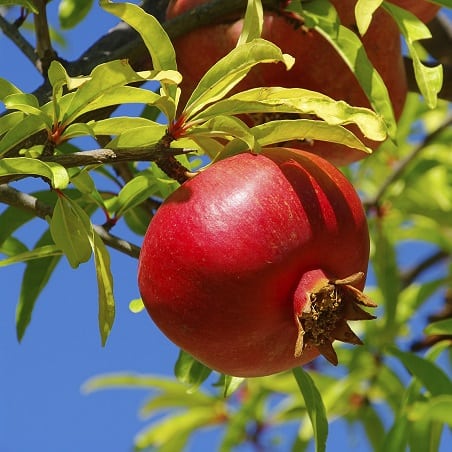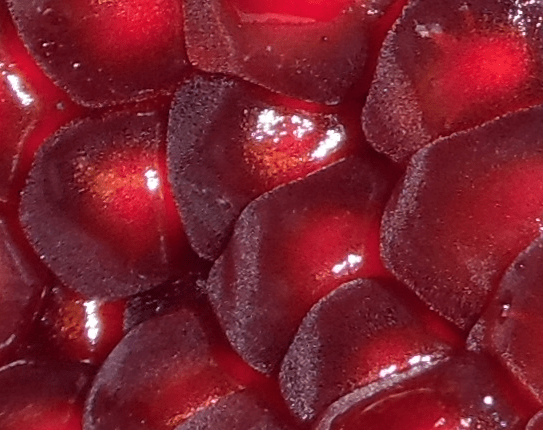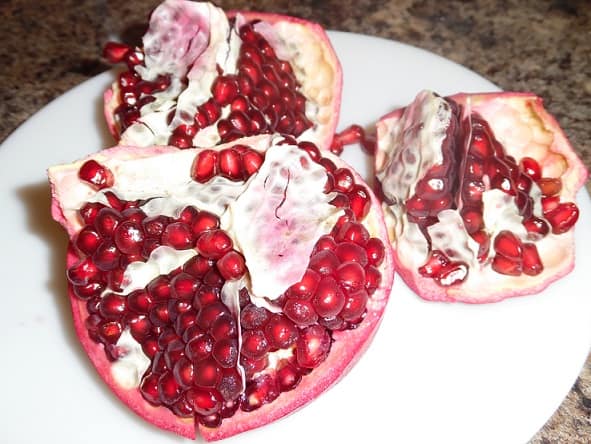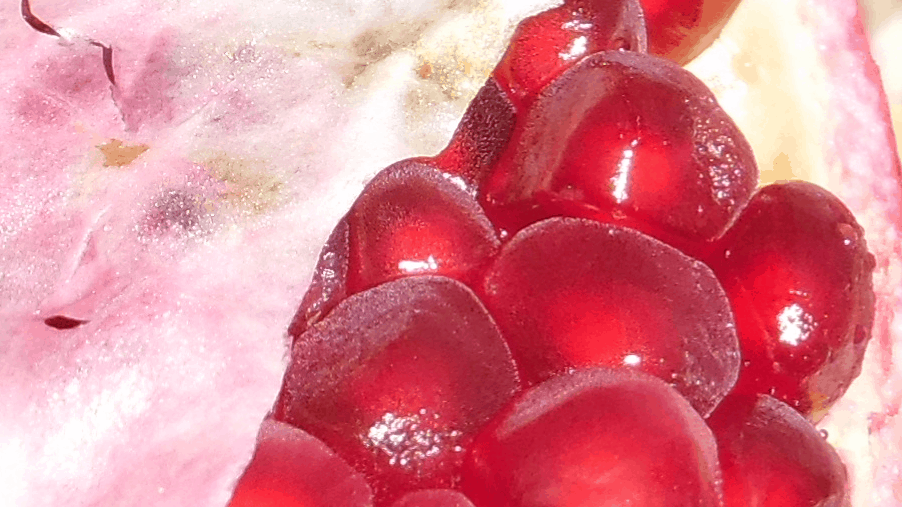 For years now there’s been a fever of excitement about so-called superfoods. These miracles, which are usually fruits or vegetables, are supposed to be highly nutritious, packed full of acne-clearing antioxidants, and associated with a ton of health benefits in scientific studies.
For years now there’s been a fever of excitement about so-called superfoods. These miracles, which are usually fruits or vegetables, are supposed to be highly nutritious, packed full of acne-clearing antioxidants, and associated with a ton of health benefits in scientific studies.
The likes of the blueberry, the coconut, and broccoli are all members of this prestigious club, and one of the latest foods to receive this honour is the humble pomegranate.
Health nuts everywhere are stocking up on pomegranates, but is this just hype, as is often the case in the nutritional world? And if pomegranate is a superfood for your health, could it be fantastic for your acne too?
As we discussed in my eBook Annihilate Your Acne, it’s a smart idea to eat a wide variety of fruits and vegetables, since many contain unique compounds and antioxidants which indirectly contribute to clear skin. Many other fruits like strawberries have specific nutrients, like vitamin C, that are great for acne. Are pomegranates just as skin-friendly?
History suggests pomegranates have powerful benefits
Throughout history there have been countless civilisations that valued the pomegranate. The pomegranate tree originated in modern day Pakistan, but by the age of the Pharaohs, merchants had brought it all the way to Egypt.
There it is said that the Pharaohs demanded a pomegranate to be available at all times. The Egyptians believed that the fruit had so many benefits that it became their symbol for life after death.
The Hindus worshipped the pomegranate as a superfood; it has been their symbol of health and fertility for centuries. The old Zoroastrians believed it to be so healthy that the pomegranate became their symbol for eternal life.
All throughout history we see signs of civilisations valuing the pomegranate above all other fruits. It’s true that these civilisations were no stranger to superstition; the Egyptians were famous for ripping out the organs of dead bodies and storing them in jars, to grant the victim access to the afterlife…
Read Annihilate Your Acne – get the ultimate diet and clear your acne permanently!
…but pomegranates pop up so frequently in the books of history that there must be some truth to their powers. Belief in an afterlife, for example, is common to most ancient civilisations, but it would be strange for a single fruit to be so regularly singled out if it wasn’t particularly healthy. You don’t see bananas getting worshipped anywhere.
Conclusion – there’s good evidence throughout history that pomegranates have at least some medicinal power. Therefore it is highly plausible that they improve your acne too.
Pomegranate acne nutrition
Now that we have science we don’t have to rely on centuries of wisdom. Instead we have the means to analyse each fruit’s acne-clearing powers in detail, and almost all studies on both pomegranate seeds and its juice indicate that the legends were correct after all.
The term superfood hints at a food bursting with vitamins and minerals, but pomegranates contain very few that are good for acne. In terms of the daily allowance, 100 grams of fresh pomegranate contains 3% of the daily allowance for vitamin E, 3% of magnesium, 2% of zinc, and no vitamin A at all.
Recommended – the top 6 vitamins and minerals for acne-free skin
It’s a decent source of vitamin C, with 13% of the daily allowance, but nowhere near as strong as other fruits: 100 grams of strawberries contains 98% of the RDA. Pomegranate seeds have decent amounts of folate and vitamin K, but it’s still nothing exceptional and they’re not among the top acne nutrients.
Also, the acne nutrients in pomegranate can easily be found in other foods; berries, potatoes and broccoli are all better sources of vitamin C (which clears acne by accelerating collagen production) and are much more easily available. If you look at the pomegranate’s basic nutrition then it’s hard to see why it’s a superfood at all.
So why are pomegranates recommended for acne patients then?
Because while pomegranates are not very nutritious, that was never their main selling point for acne in the first place…
…by far their biggest anti-acne power is their strong range of antioxidants. Pomegranates have been shown repeatedly to have extremely high levels, even compared to most fruits.
A handful of pomegranate seeds is estimated to have nearly five times as many total phenols, flavanols and other antioxidants as an apple, and that’s a good food for acne itself. Antioxidants are measured by the ORAC scale and while strawberries score a respectable 4302, pomegranates score a massive 10,500.
That is also greater than raspberries, pineapple, oranges, bananas, etc. Even the blueberry only scores 4669, and that fruit is constantly being praised by scientists for its antioxidants.
The top 7 topical treatments for clearing acne naturally
Not only are pomegranates high in total antioxidants, but the specific subsets they contain the most of are particularly powerful for acne. Pomegranates are especially high in anthocyanins, a member of the flavonoid class of antioxidants. These powerful acne antioxidants give the pomegranate its red colour and are responsible for the health benefits of many other fruits like strawberries, raspberries, cherries and blackberries.
One study found that anthocyanins isolated from cherries had extremely strong anti-inflammatory effects, and they’ve also been linked to benefits like cancer prevention and improved cardiovascular health.
Pomegranates also contain high amounts of punicalagin, a highly bioavailable antioxidant that pomegranate is the only known source of. Punicalagin clearly has strong effects on the human body as it has been linked to benefits like reduced blood pressure and improvements in arteriosclerosis. Therefore we can assume that its antioxidant ability is just as powerful.
How do antioxidants help acne?
Getting more antioxidants is one of the best strategies any acne patient can follow. Sebum oxidation is one of the two big processes behind acne, and in particular blocked pores. Antioxidants, as suggested by their name, prevent this oxidation from occurring. Antioxidants are also important for reducing the total amount of free radicals in your body.
Why bread and pasta are a massive cause of acne
Free radicals are notorious for oxidising your sebum and if you destroy them before they reach your skin, you reduce the chances of acne even further. Antioxidants are also important for controlling inflammation, and are vital for overall bodily health and thus numerous indirect conditions related to acne.
One of the key pillars of any anti-acne diet is getting more antioxidants and pomegranates are a terrific way to achieve that.
Other acne benefits
 Pomegranates have been linked to numerous other acne clearing benefits; hence why they’ve been dubbed a superfood. Some of them are also due to the antioxidants, as they have many additional acne clearing powers, but many could be due to substances that science hasn’t even identified yet. The pomegranate is an extremely complicated food, with a particularly vast array of natural compounds.
Pomegranates have been linked to numerous other acne clearing benefits; hence why they’ve been dubbed a superfood. Some of them are also due to the antioxidants, as they have many additional acne clearing powers, but many could be due to substances that science hasn’t even identified yet. The pomegranate is an extremely complicated food, with a particularly vast array of natural compounds.
Pomegranates have been linked to…
Improved insulin sensitivity – this study shows that feeding fresh pomegranate juice to humans increased their insulin sensitivity significantly. Higher insulin sensitivity causes your body to produce less insulin overall, and less insulin means less sebum and less acne.
What’s also interesting is that this was just the pomegranate juice; fruit juice is typically worse for insulin than whole fruit, because its higher sugar content causes an insulin spike. If the juice was this healthy for acne, then the actual pomegranate fruit is likely even better.
Reduced cortisol levels – cortisol is the body’s main stress hormone and too much can seriously disrupt your digestion in a way that causes acne. There’s good evidence that pomegranates lower levels of cortisol in the body by inhibiting the “cortisone reductase” enzyme, which is responsible for converting cortisone to cortisol.
A study showed that when humans were fed pomegranate juice, levels of cortisol in their urine decreased, whereas levels of cortisone increased. Basically, cortisone is a much less active version of cortisol, so it is better for preventing acne if cortisone is higher and cortisol lower.
Sea buckthorn oil – a topical treatment which lowers oily skin by 45%
There’s also another study that supports this theory and in that one, scientists fed some humans pomegranate juice, and the other group a placebo. They found that after several weeks, the pomegranate group had significantly less cortisol in their saliva, while the placebo group had slightly more. They also found that the pomegranate group had higher levels of cortisone, which again suggests that pomegranate inhibits the conversion process.
Lower risk of chronic inflammation – in tomorrow’s article you’ll find out why chronic inflammation is one of the worst conditions behind acne. For now you need to know that, put simply, chronic inflammation is when your immune system is overactive and pumps out far too many pro-acne inflammatory chemicals.
Pomegranate has been shown to directly reduce these acne chemicals; one study found that pomegranate extract directly reduced the production of interleukin-6 and MCP (two pro inflammatory actors).
Then you’ve got the added bonus of antioxidants, which will clear up the excessive free radicals released during the inflammatory process. It’s likely that pomegranates are an excellent way to keep inflammation in check. The strong benefits of pomegranates for inflammation related conditions like cardiovascular disease are also good signs.
Pomegranates – one of the best fruits for acne patients
 With pomegranates you get all these acne benefits with nearly no downsides. In fact, the only slight problem is the seeds being quite high in sugar gram for gram. While 100 grams of raspberries contains 5 grams of sugar, pomegranates are much higher at around 14 grams. Sugar is the king of all acne additives and for that reason you shouldn’t eat vast amounts of pomegranate seeds.
With pomegranates you get all these acne benefits with nearly no downsides. In fact, the only slight problem is the seeds being quite high in sugar gram for gram. While 100 grams of raspberries contains 5 grams of sugar, pomegranates are much higher at around 14 grams. Sugar is the king of all acne additives and for that reason you shouldn’t eat vast amounts of pomegranate seeds.
However, the amounts required to get acne from pomegranate sugar are enormous. You can get tons of antioxidants from pomegranate by eating just one serving a day, and in this quantity the sugar will never cause acne.
Since it’s a whole fruit too, there’s plenty of fiber to slow down the sugar’s absorption and render it less damaging.
Pomegranate seeds might even be useful against acne topically. There’s no evidence to suggest that applying pomegranate directly can soothe acne, but theoretically, they should work excellently because of the plentiful antioxidants. Your skin is like a giant sponge and it absorbs almost everything it comes into contact with.
Vitamin E – the ultimate nutrient for clogged pores
Therefore if you take a pomegranate, mash up some of the flesh to extract some juice, and then apply it to your face, your skin may well absorb some of the acne nutrients.
Particularly, this will deliver a concentrated burst of antioxidants that will prevent your sebum from oxidising. A pomegranate is well suited to application too; you can use a single seed for each individual pimple, as the amount of juice will be exactly what is needed. Pomegranate juice also dries out fairly well.
Conclusion
Pomegranates are a terrific food for clearing acne. The antioxidants alone would be enough to recommend them, but with the anti-inflammatory and stress-busting benefits too they clearly are a “superfood”, for your acne at least. Pomegranates do live up to the hype swirling around them.
If you like the taste of pomegranates and can purchase them cheaply, it’s a good idea to eat one serving per day. That’s high enough to benefit your acne greatly and low enough to prevent a sugar overdose.
If you don’t enjoy pomegranates then rest assured that many other fruits are great for clearing acne, such as strawberries and watermelon.
How to spot the ultimate pomegranate
 I’ve been eating pomegranates every day for a year now and along the way, I’ve honed some useful strategies for picking the healthiest ones.
I’ve been eating pomegranates every day for a year now and along the way, I’ve honed some useful strategies for picking the healthiest ones.
Firstly, you’ve got to pick the pomegranates with a darker colour. As we discussed earlier, it’s the anthocyanin antioxidants within pomegranates that provide the red-purple colour they’re famous for. Well, it’s also the anthocyanin antioxidants that provide all the acne clearing benefits.
Therefore the darker a pomegranate is, the more healthy compounds it’s loaded with. I’ve found that a richly colourful skin of the fruit correlates well with darker seeds inside, so look for the darkest pomegranate you can get.
Secondly, it’s the acne friendly antioxidants that provide much of the flavour too. The flavours of nearly all fruits, whether it’s an apricot or a banana, are a result of their endlessly varying compounds. Unless it’s a sweet and sugary pleasure, a pomegranate that tastes great is likely to be especially great for your acne. Another flavour to look for is bitterness, which is a classic sign of abundant antioxidants.
Finally, I’ve got a few less tested strategies which I’ll share regardless. As a result of tasting many different brands, I have a hunch that pomegranates sourced from Peru taste particularly great, and thus have more antioxidants.
Also, larger pomegranates seem to be far more flavoursome. Small pomegranates are OK and they often have the correct dark colour, but the seeds taste completely bland. The type I’m talking about are moderately small and so perfect looking that they seem to made of plastic. It’s obviously a particular agricultural strain, and it tastes terrible! I consistently find that large ones taste far better. The strain I’m talking about has a very smooth and bland looking skin. It’s still very dark, but the tastier pomegranates look more “rustic” and have a rougher textured skin.
In your country these peculiarities will doubtlessly vary but this acne-friendly guide should be of some use to nearly everybody.
Finally, remember that pomegranates are very cheap, and are a tasty way to load your skin with the acne-clearing nutrition it needs.
Update 19/2/2018 – the tale of pomegranate seed oil
A pomegranate may not be oily, but its seeds are rich in fat, and by cold-pressing them or blasting them with chemical solvents in an industrial factory (or just squeezing them if you happen to be a gorilla), you can make a purple tinged skincare oil.
Remember that being extracted from pomegranate alone does not guarantee that the oil is anything special, so does it work?
Firstly, pomegranate seed oil is surprisingly high in vitamin E, the greatest nutrient for preventing clogged skin pores. One study compared pomegranate seed oil to flaxseed oil, and detected total tocopherol concentrations of 175mg and 51mg respectively; tocopherols include alpha, gamma, delta and beta forms and are one of the two main classes of natural vitamin E.
As for the second little known fact, 78% of its total plant steroids consist of beta-sitosterol, also found in sea buckthorn oil.
When applied topically, beta-sitosterol binds to DHT receptors in your sebaceous glands, preventing the testosterone-related DHT hormone from enlarging them and pumping up their oil production. Pomegranate seed oil is much feebler for stigmasterol (3% of total), the plant steroid behind saw palmetto’s anti-DHT properties, but that probably won’t save your acne.
One flaw compared to sea buckthorn oil or rosehip seed oil is its lack of beta-carotene, with just 3.17mg per 100 grams, but uncommonly, pomegranate seed oil is very rich in polyphenols and flavonoid antioxidants.
As for its moisturising properties, pomegranate contains just 6% oleic acid (damaging for hydration) and 7% linoleic acid (beneficial for hydration), with the majority of its fatty acids being the ultra rare punicic acid, AKA omega 5, aside from oils sourced from freak growing conditions where abnormal heat and soils result in linoleic acid becoming higher again.
The effect of punicic acid on hydration and the skin barrier is a mystery, making pomegranate seed oil a mystery too, but it’s at least safe for experimentation, with little oleic acid and a comedogenicity score of just 1 out of 5. Furthermore, punicic acid is being furiously researched at the moment, and anti-inflammatory properties are starting to emerge.
As for pomegranate seed oil overall, applying it to animal tissue increased type 1 collagen levels in one small study. Meanwhile, an extract of the pomegranate fruit stabilised existing collagen, because of its classic antioxidant ellagic acid binding to the protein structures, and it also increased the main collagen precursor procollagen 1.
The final promising power right now is UV radiation resistance, according to a study on human skin (rather than dog skin or even alien skin). Despite their wildly different nutrient profiles, both the pomegranate oil, extract and whole fruits prevented sunlight from damaging the skin samples.
Benefits included suppressing UV light free radical formation, keeping elastin intact, and complimenting the studies above, preventing UV-induced increases in collagenase, the enzyme which breaks down existing collagen.
So can you guess what the ultimate solution is? Possibly buying some cold-pressed pomegranate seed oil, and then mixing it with some fresh, organic pomegranate juice, whether bought from the shop or blended up in your own juicer. You will get the best of both worlds with both the collagen and sunscreen properties, and a rich elixir of antioxidants.
These strategies are all preliminary, and so is the research on pomegranate seed oil overall. It’s much more promising for acne itself right now than it is as a moisturiser, but we only need one great study on punicic acid’s relation to hydration to change things. The mysteries of punicic acid also give pomegranate seed oil particularly high potential compared to other unexplored topical treatments.
How do you obtain pomegranate seed oil? By purchasing this Leven Rose Unrefined Pomegranate Seed Oil.
This brand is cold-pressed, extracted without any harsh chemicals like hexane, using only traditional methods. It also comes in a dark, amber glass bottle to prevent sunlight from damaging the oil. Pomegranate seed oil is a strong oil anyway, thanks to its natural antioxidant armour, but the bottle will keep it extra fresh and deadly against your pimples.
NEXT: get the complete strategy for clearing acne naturally
Thanks for reading!

I’ll give this a try! ?
Can I take pomegranate pills to get the benefits?
If it’s well formulated then yes, but instead of taking pills you could just eat another fruits like apples (which are surprisingly antioxidant-rich).
Thanks for the reply munching on apples right now